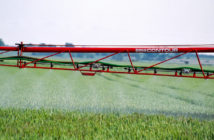Septoria resilience was a key factor in winter wheat performance last season. That is the message from Syngenta seeds marketing manager, Kathryn Hamlen, who says arable crops were subjected to multiple pressures during 2023 – including persistent rain during spring which fuelled a Septoria tritici epidemic, a hot and dry June, then a wet summer that caused a stop-start harvest.
“Robust resistance to Septoria tritici may have helped certain varieties to better withstand the effects of the prolonged rainfall periods,” says Mrs Hamlen. “This could partly explain why the hard feed wheat Graham has again yielded well this year. With its Septoria tritici resistance rating of 6.7 on the AHDB 2023-24 Recommended List (RL), Graham has continued to perform up to its usual treated yield standard.
“In addition, varieties which grow deeper roots may have been better able to scavenge for moisture during the dry June. With its good Septoria tritici resistance rating of 6.4 on the

Graham performed well again at WPD Holland and Sons, Lincs
plus evidence emerging of its good rooting ability, this may explain why SY Insitor turned in particularly impressive yield results this harvest.
“Choosing varieties that deliver dependable yield performance over different seasons is a key consideration to help arable farms remain resilient.”
One grower who has once again had success with Graham during 2023 is David Bristow, farm manager for a 250 ha arable plus beef enterprise at WPD Holland and Sons, near Lincoln.
With soils ranging from sandy to heavy clay, he says Graham as a first wheat averaged 10.1 t/ha this summer – meaning it met the farm’s target despite overcast skies meaning it also did not receive much sunlight.
Graham also remained noticeably clean against Septoria tritici using the farm’s standard fungicide programme, Mr Bristow notes. “It was visibly cleaner early, especially when we had the wet spell in May. Graham is a steady wheat that does what it says,” he points out.
After these positive results, he says the business is growing Graham again for harvest 2024, with roughly a third of the farm’s 85-90 ha of winter wheat earmarked for the variety.
He says he also likes Graham’s early maturity, which spreads harvest workload versus other varieties to reduce weather window bottlenecks.




